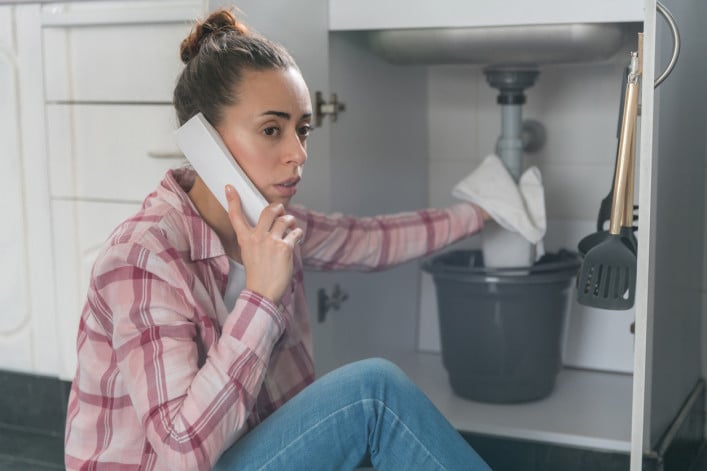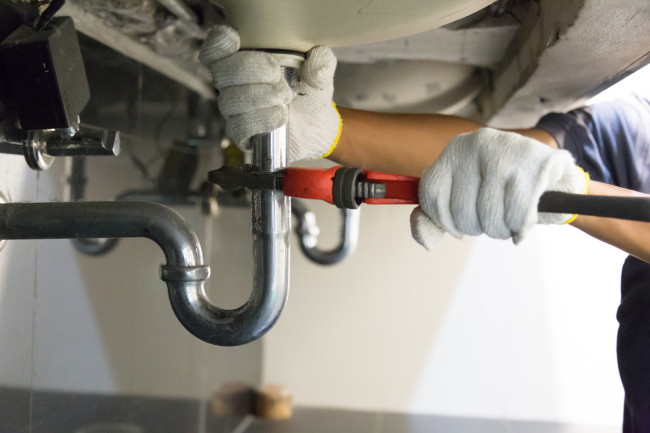Here's what I learned to get our absentee landlord to fix things fast
- Get to the point quickly in text or email communication and explain what you have already tried
- Document the problem with photos or video; narrate your videos and explain what you're filming
- It's a good idea to occasionally let the owner know when you've handled a problem on your own

When we discovered a leak in the pipe connected to the kitchen sink drain, we first tried to tighten the connection ourselves.
iStock
I cringe when I recall the first few emails I sent to our landlord who lives in California about some problem in our Brooklyn townhouse rental: Messages prefaced by timid, time-wasting phrases like “sorry to bother you” and the long dialogue that followed until we established what the problem was and how it would be fixed.
Now, a few years into having an absentee landlord, I’ve hit on a more effective communication strategy and have reduced our typical email discussions about repairs to two messages: One from me, in which I state the problem and document it visually—and one from her, to say how and when it will be fixed.
Of course, not every problem can be neatly wrapped up like this—but using clear and effective communication can help get the work underway sooner. Here’s what I’ve learned—consider this a checklist for dealing with your own absentee landlord when you need something repaired.
[Editor's note: A previous version of the article ran in August 2024. We are presenting it again in case you missed it.]
Troubleshoot before asking for help
Before we email our landlord, we now make sure we’ve done everything we can to fix the problem ourselves, with some important caveats: Other than flipping circuit breakers and unclogging drains (my husband recommends this snake—a must when you have daughters with long hair) we don’t touch anything electrical or plumbing related.
Why do we do this? For one thing—it means that we only are communicating when there’s something big and so we get faster attention. It also has opened our eyes to how much we can accomplish ourselves with minimal effort.
It's a change for us as longtime renters. We had long been used to having a super or handyman take care of just about everything. Now, in a place without a super and a landlord that’s three time zones away, we’ve spent many weekend afternoons taking care of small repairs by ourselves.
Fortunately there’s an amazing amount of content on YouTube explaining how to do things, like repair a slow draining tub (start by removing the overflow cap), how to unlock a locked dishwasher (why manufacturers include a lock is mystifying), and what to do when your keyless door lock stops working (change the battery).
Get to the point immediately and…
You don’t need to be dramatic or rude, but don’t waste time on conversational niceties in a crisis. If you’re emailing, state the issue plainly in the subject line, or at the very top of your text message.
Everyone is overwhelmed with communication these days. Writing “hi” in a subject line or wasting the first part of your message with “hope you are well” when your bathroom ceiling has caved in may not get you the immediate response you need—and worse, to a busy person scanning the top part of a message, may not indicate you have a problem at all.
…explain what you have already tried
I also find it’s very helpful to describe what we have already done and what didn’t work—it moves the process along faster. Understandably, an owner will want you to several possible solutions before they commit to paying for plumber to show up—so I like to avoid the back and forth as much as possible, especially when there’s dirty water involved.
I’ve learned providing the right details along with my initial email means we get immediate attention.
For example—when we discovered a leak in the pipe connected to the kitchen sink drain—we first looked to see if we could tighten the connection ourselves—but a piece (called the collar) was completely missing—it had rusted and broken off. I explained this briefly and the owner responded saying she was calling the plumber to fix it.
Similarly, when rainwater was seeping through a basement door from a flooded storm drain outside—we explained we were keeping the drain free of leaves and debris and had blocked off the basement door as best we could. But nothing we did was working and we needed help. And we got it—instead of being given a list of things to try. (A burned-out sump pump was the culprit in that situation.)
Always take a video
I always take a very short video to accompany any communication about a problem—nothing conveys the situation better. Broken pipe, 15 second video. Clogged storm drain, 20 second video. Water coming through the wall during Hurricane Ida, 40 second video.
You don’t have to do anything fancy. This isn’t a TikTok. Just make sure the area that needs attention is well lighted (if the space is dark have someone aim their flashlight at it while you film). Try to talk while you are filming, point out what is wrong and be sure to pull back and scan the area a little so the owner can understand where exactly the damage is located.
An owner will know more about the guts of a place than you—so showing where, for example, water is coming from can get you to a solution much faster than saying, “there’s a leak in the bathroom.”
Share the win
Just because we are taking care of minor fixes doesn’t mean we keep them all to ourselves. Once in a while I think it’s a good idea to send a quick note to say, for example, I noticed there was a small problem (rats getting into the garbage can outside) and how I fixed it (cinder block on top of the garbage can lid). Just letting you know, dear owner!
You don’t need to draw attention to everything you do—that would be weird. But showing how you are caring for the property and being a responsible tenant is how you can bank some goodwill—and that can benefit you in the future, for example when negotiating a lease renewal.
It’s also important in case a small problem becomes a big problem. Surprise repair jobs are never fun—so by sending a message about what you’ve done, you’re indicating that you’re aware of a potential situation and putting it on your landlord’s radar. Just in case.
You Might Also Like




























